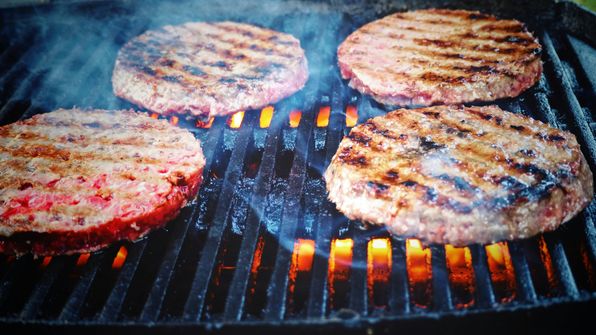
Seasonal Adjustments to the Carnivore Diet: A 2024 Guide for Women’s Wellness
The carnivore diet is often seen as straightforward: eat meat, keep it simple. But adapting it seasonally can bring freshness, variety, and local flav...

Social gatherings often mean a spread of carb-heavy foods and tempting desserts that can make sticking to the carnivore diet feel tricky. But with a bit of strategy, it’s possible to enjoy time with friends and family without compromising your dietary goals.
Here are some supportive, practical tips to help you feel confident and prepared for any social occasion—restaurant meals, family dinners, or casual get-togethers—while staying true to your carnivore approach.

Preparation can make all the difference. Eating a satiating carnivore meal before heading out can keep you full and make it easier to avoid foods that don’t fit your diet. This can help you manage temptations, especially at events where choices are often limited to non-carnivore options.
Consider having a protein-rich meal like steak or eggs before leaving. This not only keeps you full but also ensures you’ve met your dietary needs, allowing you to enjoy the social aspect of the event without feeling deprived.
Example: Before a family gathering, have a few boiled eggs or a small steak to curb hunger. That way, you’re less likely to feel tempted by carb-heavy appetizers or sugary desserts.
Research Insight: Studies published in The American Journal of Clinical Nutrition have shown that high-protein meals increase satiety, making it easier to resist additional snacks or desserts at social events.
Most restaurants have options that fit within a carnivore diet—you just have to know where to look. Opt for dishes with simple ingredients like grilled meats, seafood, or eggs, and request modifications to meet your needs. Don’t be afraid to ask for a dish to be customized; many restaurants are more accommodating than you might expect!
Most places offer plain grilled meats, burgers without buns, and breakfast items like eggs and bacon. Feel free to ask for extra protein, or swap out side dishes for a double portion of meat or eggs.
Example: At a steakhouse, order a grilled steak or fish with butter and ask to substitute any vegetable sides with a double portion of meat.
Family gatherings can be challenging, especially if others don’t fully understand or support your dietary choices. The key here is to keep it light and avoid making food the focus of the conversation. Bringing your own carnivore-friendly dish to share, like a meat platter or deviled eggs, allows you to stick to your diet and adds to the meal without drawing attention.
Bringing a dish allows you to enjoy something you can eat while giving others a chance to try it as well. Options like meatballs, deviled eggs, or a charcuterie board with various meats and cheeses are carnivore-friendly and usually well-received by others.
Example: For a family potluck, bring a platter of grilled meats or a meat and cheese tray to ensure there’s something satisfying and carnivore-compliant for you to enjoy.
Research Insight: Studies on social eating behaviors published by Celiac Disease Foundation suggest that bringing your own dish can make social gatherings less stressful for those with dietary restrictions.

At informal gatherings with friends, the focus is often on socializing rather than the food itself. This can make it easier to navigate, as you can politely decline food without the pressure of a sit-down meal. If you feel comfortable, you can explain your dietary approach, but often, a simple “no, thank you” works perfectly fine.
If someone offers you a non-carnivore snack, a polite “no thanks, I’m good” keeps the conversation easy. This allows you to stay focused on enjoying the moment without feeling pressured to explain or justify your choices.
Example: At a casual get-together, stick with a water or sparkling water and focus on connecting with friends. Enjoying the social experience takes the spotlight off what you’re eating (or not eating).
Research Insight: According to The Journal of Nutrition Education and Behavior, practicing polite refusals can help people manage dietary boundaries without feeling socially awkward.
Maintaining your carnivore diet at social events ultimately comes down to staying confident in your choices. This diet is about fueling your body with foods that make you feel your best, and prioritizing your health can be empowering. Remind yourself of the benefits you’re experiencing, and let that fuel your resolve to stay on track.
Instead of seeing dietary boundaries as restrictive, view them as a form of self-care. Embrace the idea that you’re prioritizing what makes you feel good, and that’s worth celebrating.
Example: Before attending an event, take a few minutes to remind yourself of how much better you feel on the carnivore diet. This mindset shift can make it easier to avoid foods that don’t serve your goals.
Research Insight: Research in Health Psychology suggests that setting personal health goals and staying focused on benefits can improve adherence to dietary changes, even in social settings.
Q: How can I stay on the carnivore diet at a restaurant?
A: Many restaurants offer simple meat-based dishes that work well with the carnivore diet. Ask for grilled meats or seafood, request to substitute any sides with extra meat or eggs, and avoid sauces or breading. Restaurants are usually accommodating of dietary requests.
Q: What’s a good approach for sticking to the carnivore diet at family gatherings?
A: Bringing your own carnivore-friendly dish, like a meat and cheese platter or deviled eggs, can be a great way to ensure you have something to eat that aligns with your diet. This also provides an opportunity to share a bit of your diet with others without feeling left out.
Q: How can I politely refuse non-carnivore foods at social events?
A: A simple “No, thank you, I’m good” usually suffices. If someone presses, you can mention you’re focusing on foods that make you feel your best. Most people understand and respect this approach, especially when kept casual.
Q: Will people understand my dietary choices if I explain?
A: Many people may not be familiar with the carnivore diet, so brief explanations are often enough. Explain that it’s a way of eating that makes you feel good, and leave it at that. Most friends and family respect dietary choices, especially when you focus on feeling your best.
This article provides general information regarding dietary strategies for social situations and is not intended as dietary or medical advice. Before starting or adhering strictly to a carnivore diet, consult with a healthcare provider or nutritionist, as individual needs vary. Women with specific health conditions or dietary restrictions should seek personalized advice to ensure they meet all nutritional needs. The carnivore diet may not be suitable for everyone, and individual results can vary based on numerous health factors.
Navigating social situations on the carnivore diet doesn’t have to be a struggle. With a bit of preparation and confidence, you can enjoy time with friends and family while staying true to your health goals. Remember, the focus is on connection, and when you’re confident in your choices, it’s easier to enjoy yourself without feeling left out.
Takeaway: By planning ahead, making smart menu choices, and focusing on the social experience, you can maintain your carnivore diet and feel great at any gathering.
Embrace it: The carnivore diet is a choice you make for your health—approach it with confidence, and enjoy every moment with friends, family, and good food.

The carnivore diet is often seen as straightforward: eat meat, keep it simple. But adapting it seasonally can bring freshness, variety, and local flav...

The carnivore diet has become increasingly popular, but like any extreme dietary approach, it raises important questions—especially for women concerne...

The carnivore diet has gained attention globally, but women’s experiences and cultural approaches to animal-based eating vary widely depending on wher...

Living with Chronic Obstructive Pulmonary Disease (COPD) can make everyday activities feel like a marathon, especially for women who are juggling heal...

recovering from COVID-19 can be a long journey, especially for women who may face lingering symptoms like fatigue, brain fog, and muscle weakness. Whi...